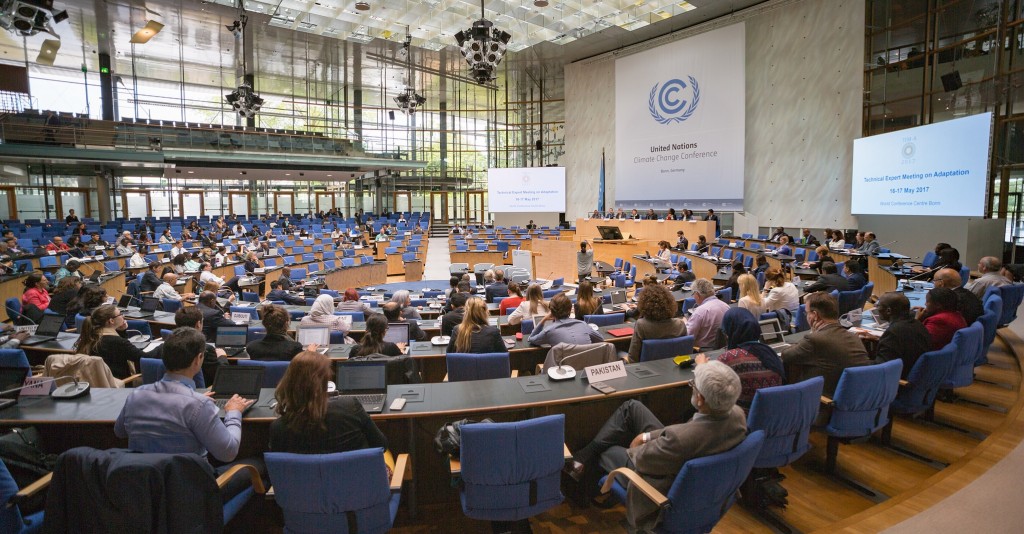Bonn, 10 Nov (Jade Chiang) – The climate talks in Bonn could be a historic moment if Parties are able to commemorate the 20th anniversary of the adoption of the Kyoto Protocol (KP) by ensuring the entry into force of its second commitment period (CP2), said developing countries at a press conference organised by the Like-minded Developing Countries (LMDC) along the sidelines of the 23rd session of the Conference of Parties to the UNFCCC (COP23) on Nov. 9.Walter Schuldt (Ecuador), Chair of the Group of 77 and China, representing 134 developing countries, said that “We are celebrating the second anniversary of the Paris Agreement adoption but we are really looking forward to the stronger celebration of the 20th anniversary of the adoption of the KP with the implementation of its CP2.”
“All we are asking is to bring this sense of urgency (in the climate talks) to be translated into concrete actions in the pre-2020 time frame,” said Schuldt.
He emphasised the need for urgency on ambition, and reiterated the solidarity and sympathy to victims of recent extreme weather events.
Schuldt also noted that the request to have the pre-2020 matter to be included in the UNFCCC’s COP23 agenda is not a new proposal as there is a strong linkage to the Bali Action Plan (adopted in 2007), adding that “we are here to support the Fijian Presidency” and that “we are all in the same canoe.”
“We recognise there are many gaps in terms of mitigation and financial support that developed countries need to address,” he stressed.
Apart from the G77 and China Chair, other members of the LMDC also spoke at the media conference and echoed similar sentiments on the need to show urgency in addressing the ambition gap in both mitigation and finance.
Spokesperson of the LMDC, Majid Shafiepour (Iran) who facilitated the event, said that the LMDC which represented 50% of the world population had called for the inclusion of an agenda item at COP 23 which called for more ambitious and accelerated climate action to be taken in the pre-2020 period.
He added that the LMDC was trying to keep the dialogue on pre-2020 actions alive and noted the urgency to take stock of the progress of the “unfinished business” that remained.
(The LMDC proposal for the inclusion of the pre-2020 agenda item has not been possible due to objections from developed countries including the United States and the European Union.)
(See TWN Update 7- https://twnetwork.org/climate-change/developed-countries-oppose-inclusion-pre-2020-actions-cop23-agenda )
Minister for National Policies Secretariat of the Presidency Government of Nicaragua, Paul Oquist said the pre-2020 agenda item was surprisingly dropped from the agenda of COP23 after many years of working on it.
“(At the) Durban (2011) and Doha (in 2012), we issued blank cheques with no amount (on the level of emissions reductions on the CP2) and no date (on the duration of the commitment period),” he recalled, in reference to decisions adopted at the 17th and 18th meetings of the COP (that launched the work which paved the way for negotiations for the post-2020 time frame that resulted in the PA and the Doha Amendment that anchored the CP2 of the KP.)
(The Doha Amendment recognised the need for Parties to deposit their instrument of acceptance (of CP2) without delay in order to ensure the prompt entry into force of the amendment to the KP and also decided that Annex 1 Parties will revisit their respective quantified emission limitation and reduction commitment for the CP2 at the latest by 2014 and increase that to at least 25 to 40% below 1990 levels by 2020.)
“Five years after Doha, the ratification of CP2 has not been fulfilled. It is, therefore, incomprehensible to talk about post-2020 when the developed country Parties failed to comply with their commitment,” lamented the Nicarguan Minister.
He said further that the KP’s CP2 is in “the intensive care unit.”
“As a consequence, the message of COP23 would be that it does not see the urgency and that flies in the face of the climate realities and science is thrown overboard,” added Oquist as he listed a string of extreme weather events in the Latin American region.
He also pointed out that many scientific analyses are warning that “if we do not get our act together by 2020 by cutting emissions drastically now for a 66% chance of keeping temperature rise to 2°C by 2100 and 50% chance of staying below 1.5°C, ‘we can forget about the 2°C or pursuing 1.5°C limit of the Paris Agreement’. He said the technology and capital exist but what is lacking is the political will.
Additional Secretary of the Ministry of Environment, Forest and Climate Change of India, Arun Kumar Mehta said that “there cannot be argument that between now and 2020 is not important. (Honouring) pre-2020 commitment is to build trust and all Parties have to move together … Delaying actions will not benefit anyone ,” he stressed.
Referring to paragraph 3 and 4 of decision 1/CP.19 adopted at COP19 in Warsaw (2013) in which Annex 1 Parties are supposed to provide support and undertake highest possible mitigation efforts to enhance ambition in the pre-2020 period including the entry into force of the CP2,Ravi Prasad of the Indian Climate Change Division of the Ministry of Environment, Forest and Climate Change said that developing countries made a humble request is to bring on the table the follow-up actions of those decisions.
He further pointed out that there is no space among the many agenda items to discuss these past decisions and how Parties have (or have not) honoured them.
Prasad said that timelines could be proposed in May or June 2018 for the ratification of Doha Amendment to ensure the coming into force of the CP2 and for submissions from all developed country Parties indicating the actions they have taken on paras 3 and 4 of decision 1/CP.19.
“If we see this forward movement, there will be clarity, trust and commitment to take these actions forward. We hope we can take this decision at this COP to ensure that trust in this multilateral process continues and we are on track to bridge this ambition gap and be on track for post-2020 actions,” he emphasised.
Director of the Department of Climate Change of the National Development and Reform Commission, Chen Zhihua (China) underscored that the pre-2020 actions are very important not only for the LMDC but for all developing countries. He said all developing countries were very firm on this matter because they felt there is still a very big gap not just on actions but also support.
“The Paris Agreement already entered into force but it has been five years since the adoption of the Doha Amendment and we only have two years left to 2020. We want to highlight that this year is the 20th anniversary of the adoption of the KP and the best way to commemorate it is to put the CP2 into effect … that will be the historical moment,” said Zhihua.
“The other action is to put in place a mechanism to realise the revisit mechanism of Doha and Warsaw with regard to enhancing ambition (of Annex 1 Parties). It is clear that the developed countries need to examine their commitment on the mitigation targets and explore ways to close the gap,” he added.
He said Parties are busy negotiating the modalities, procedures and guidelines of the Paris Agreement but the agreement is to be implemented after 2020. It is more urgent for us to take actions now, he stress ed further.
“If we do not respect the decisions (taken in the past), how do we trust the process and lay goodfoundation for the implementation of the Paris Agreement?” he asked.
The media conference was well attended, with many journalists and civil society present, and was beamed live around the climate conference centre. – Third World Network




